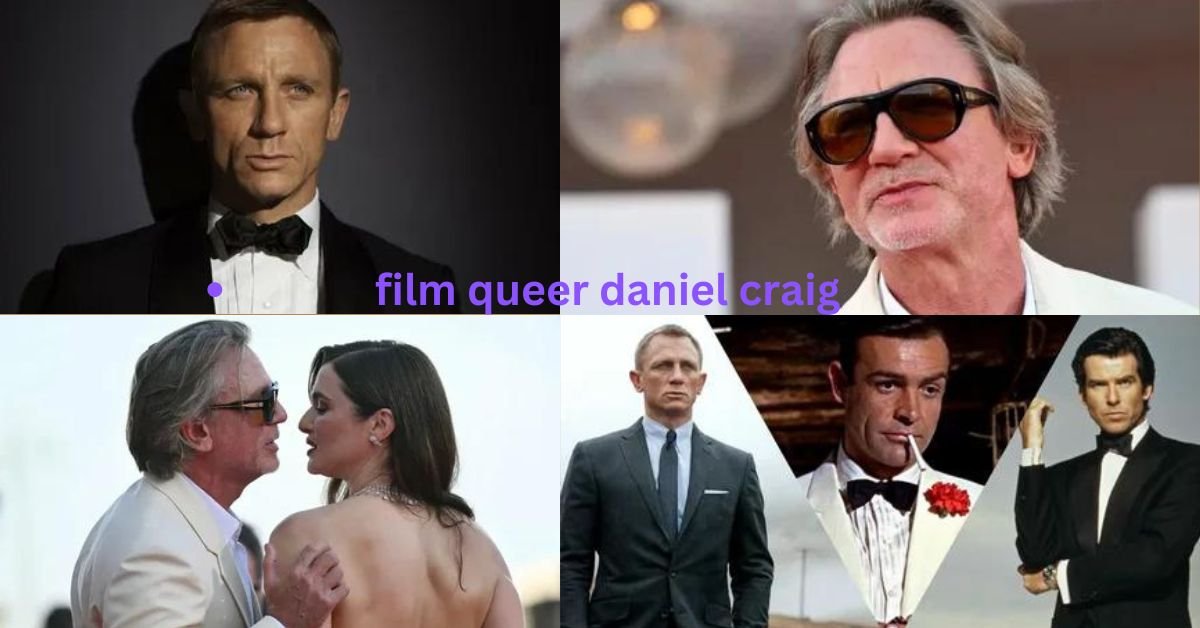When we think of Daniel Craig, most of us immediately associate him with the iconic role of James Bond, the suave British secret agent he has portrayed for over a decade.
However, beyond the world of espionage, Craig has demonstrated impressive versatility throughout his career, including tackling roles that explore queer identities and themes.
The keyword “Film Queer Daniel Craig” reflects the growing interest in exploring the range of Craig’s acting portfolio, especially in terms of his participation in films that explore queer characters and themes.
This article dives deep into Daniel Craig’s connection with queer cinema, examining his performances in films where he either plays a queer character or works within a narrative that explores queer themes.
We’ll look at these films and the impact they’ve had on his career, his views on LGBTQ+ representation, and the broader significance of queer roles in cinema.
Daniel Craig’s Early Career and the Evolution of His Roles
Before becoming the action star we know today, Daniel Craig began his acting career in smaller, often independent films, where he honed his skills in various genres. Born in 1968 in Chester, England, Craig trained at the National Youth Theatre and later at the prestigious Guildhall School of Music and Drama.
Throughout the 1990s and early 2000s, Craig took on a variety of roles in films that often addressed complex social issues, allowing him to portray a broad spectrum of characters, including those with queer identities. While not always in the spotlight, these roles showcased his willingness to push boundaries and challenge traditional gender and sexuality norms in cinema.
Daniel Craig’s Queer Film Roles
- Love Is the Devil: Study for a Portrait of Francis Bacon (1998)
One of the most notable early films in which Daniel Craig plays a queer character is “Love Is the Devil: Study for a Portrait of Francis Bacon” (1998), a biographical drama directed by John Maybury. In this film, Craig portrays George Dyer, the lover and muse of the famed British painter Francis Bacon (played by Derek Jacobi). The film delves deep into the tumultuous and often toxic relationship between the two men, offering a raw exploration of love, obsession, and artistic inspiration.
Craig’s portrayal of George Dyer is both haunting and vulnerable. Dyer is depicted as a troubled young man, plagued by insecurities and struggles with his sense of self-worth, especially in the shadow of Bacon’s genius. Their relationship is fraught with emotional turmoil as the artist adores and exploits Dyer. The film does not shy away from the complexities of queer relationships, particularly at a time when homosexuality was still stigmatized in British society.
Critics praised Craig’s performance for its depth and intensity, and the film itself became an essential contribution to queer cinema, offering a raw, unflinching look at the intersection of art, love, and self-destruction.
- Enduring Love (2004)
Another film in Daniel Craig’s portfolio that touches upon queer themes is “Enduring Love” (2004), an adaptation of the novel by Ian McEwan. While Craig’s character, Joe, is not explicitly queer, the film delves into themes of obsession and emotional entanglement between men. The story revolves around Joe, a university professor whose life drastically turns after witnessing a tragic ballooning accident. One of the other men at the scene, Jed (played by Rhys Ifans), develops an intense, unreciprocated obsession with Joe.
Though the film does not feature a romantic or sexual relationship between the two men, Jed’s fixation on Joe has strong homoerotic undertones. The portrayal of male obsession in the film explores the complexities of emotional intimacy between men, especially in the context of unrequited affection. Craig’s performance highlights Joe’s internal struggle as he grapples with Jed’s relentless pursuit and his confusion and fear.
“Enduring Love” is a psychological thriller that, while not explicitly a queer film, offers viewers an exploration of the fluidity of attraction and the psychological impacts of obsession. It’s a nuanced portrayal of how emotional bonds between men can become fraught with tension and ambiguity.
Daniel Craig and LGBTQ+ Themes in Cinema
While Daniel Craig may not be the first name that comes to mind when thinking about queer cinema, his willingness to explore complex characters and relationships in films like “Love Is the Devil” and “Enduring Love” sets him apart as an actor who is unafraid to engage with LGBTQ+ themes. Moreover, a deep commitment to authenticity marks Craig’s approach to his craft, and his performances in these films resonate with audiences because they feel emotionally honest and human.
Craig has often spoken out about his views on representation and diversity in cinema. In interviews, he has expressed the importance of portraying a wide range of human experiences, including those of the LGBTQ+ community, to foster understanding and empathy. His nuanced performances in queer-themed films have earned him praise from critics and audiences alike for his ability to bring sensitivity and complexity to these roles.
Craig’s Comments on Sexuality and Representation
In recent years, Daniel Craig has made headlines for his openness about sexuality and gender roles. He has shown an understanding of the fluid nature of identity, breaking down traditional stereotypes of masculinity, especially as someone who played one of cinema’s most hyper-masculine characters: James Bond. In an interview with The Sunday Times, Craig candidly admitted to enjoying going to gay bars, explaining that these venues offer a more relaxed and welcoming atmosphere without the toxic masculinity often found in traditional bars. This remark sparked conversations about Craig’s views on the fluidity of sexuality and his support for LGBTQ+ spaces.
Craig’s willingness to challenge the expectations placed on him as an actor—especially after playing Bond—reveals his broader interest in deconstructing rigid gender norms and celebrating diversity. His openness reflects a wider cultural shift toward acceptance of different forms of gender expression and sexuality.
Daniel Craig’s Impact on Queer Representation
Daniel Craig’s portrayal of queer characters and engagement with LGBTQ+ themes has had a significant impact on representation in cinema. Though not exclusively a “queer actor,” Craig’s willingness to take on challenging roles that explore sexuality and identity contributes to a more inclusive and diverse film landscape.
By portraying queer characters and engaging with LGBTQ+ narratives, Craig has helped break down stereotypes and broaden the scope of mainstream cinema. His performances in films like “Love Is the Devil” are significant because they highlight the complexities of queer relationships without reducing them to mere caricature or one-dimensional portrayals. Instead, Craig brings emotional depth and authenticity to these roles, making them more relatable and impactful.
The Future of Queer Cinema and Daniel Craig’s Role
As conversations around LGBTQ+ representation in cinema continue to evolve, actors like Daniel Craig will play an essential role in shaping the future of queer cinema. His performances have already paved the way for more nuanced portrayals of queer characters and themes, and his influence on Hollywood’s approach to these topics will likely continue to grow.
In recent years, Hollywood has been moving toward more inclusive storytelling, with queer characters becoming more visible in mainstream films and television. However, there is still work to ensure that LGBTQ+ narratives are told with the authenticity, diversity, and respect they deserve. Daniel Craig exemplifies how actors can use their platform to push for more excellent representation and understanding through his willingness to engage with these themes.
Conclusion
When we think about the phrase “Film Queer Daniel Craig, “it goes beyond his roles in LGBTQ+ cinema.
It reflects his broader impact as an actor who embraces complex characters and challenges societal norms and expectations about gender and sexuality. Films like “Love Is the Devil” and “Enduring Love” demonstrate his performer range and dedication to telling diverse, meaningful stories.
Craig’s openness to discussing issues of sexuality, combined with his powerful performances, positions him as an essential figure in the ongoing conversation about LGBTQ+ representation in Hollywood. As he continues to take on roles that push boundaries and challenge expectations, his influence on queer cinema and broader social narratives will undoubtedly grow.
In the end, Daniel Craig’s legacy will be not just as an action star but as an actor unafraid to embrace the complexity of human identity, making him a significant player in the world of queer cinema and beyond.


